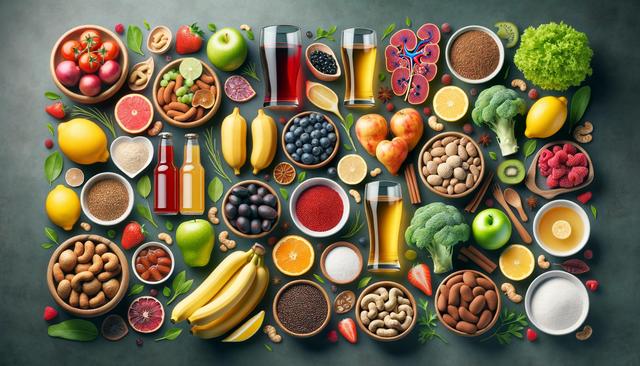Why Diet Matters for Kidney Health
For people living with kidney disease, what you eat and drink plays a major role in managing the condition and slowing its progression. The kidneys help remove waste and extra fluids from the body, but when they’re damaged, they can’t perform this function effectively. This leads to a buildup of waste and fluids, which can cause serious health problems. Many foods and beverages can put extra strain on the kidneys, especially those high in sodium, potassium, phosphorus, and added sugars. Making informed dietary choices can help reduce this strain and support overall kidney function.
Understanding which foods and drinks to avoid is a key part of managing kidney disease. While individual needs may vary depending on the stage of kidney disease and whether dialysis is involved, there are several items that are generally considered harmful. Consulting a healthcare provider or dietitian for personalized advice is always recommended, but learning the basics can empower you to make better choices day to day.
8 Drinks to Avoid with Kidney Disease
Many popular beverages can negatively impact kidney health. Some may seem harmless but contain ingredients that are hard for weakened kidneys to process. Here are eight drinks that are commonly advised against for individuals with kidney disease:
- Cola drinks – These are high in phosphorus additives, which are hard for damaged kidneys to handle.
- Energy drinks – Packed with caffeine and other stimulants, they can raise blood pressure and stress the kidneys.
- Alcohol – Even in small amounts, alcohol can dehydrate the body and interfere with kidney function.
- Sweetened iced teas – Often loaded with added sugars and sometimes caffeine.
- Flavored water with additives – Some contain sodium and phosphates, which can be harmful.
- Fruit juices (especially orange juice) – High in potassium, which is dangerous in large amounts for kidney patients.
- Milk-based shakes – Contain high levels of phosphorus and potassium.
- Sports drinks – Typically high in sodium and potassium, which are restricted in many kidney diets.
Choosing drinks like plain water or specially formulated renal nutrition beverages can help maintain balanced hydration without overloading the kidneys.
10 Foods That Could Worsen Kidney Disease
Just like drinks, certain foods can strain the kidneys and should be limited or avoided. Here are ten common food items that people with kidney disease may need to steer clear of:
- Processed meats – Bacon, sausage, and deli meats are high in sodium and preservatives.
- Canned soups – Even “low-sodium” versions often contain more salt than recommended.
- Instant noodles and packaged meals – Full of sodium and additives.
- Dairy products – High in phosphorus and potassium, which can be problematic in chronic kidney disease.
- Bananas – Very high in potassium.
- Avocados – Also rich in potassium, making them risky for kidney patients.
- Tomato products – Canned or cooked tomatoes are high in potassium.
- Whole wheat bread – Contains more phosphorus and potassium than white bread.
- Brown rice – Higher in phosphorus and potassium compared to white rice.
- Pickles and olives – High in sodium and often preserved with harmful additives.
Many of these foods can be replaced with kidney-friendly alternatives. For example, white rice can replace brown rice, and fresh herbs can add flavor without the need for salt.
Understanding Nutrients to Limit in Kidney Disease
When managing kidney disease, it’s not just about individual foods or drinks—it’s also about keeping track of specific nutrients. The most commonly restricted nutrients for kidney health are:
- Sodium – Too much sodium can raise blood pressure and increase fluid retention, making kidney function worse.
- Potassium – High levels of potassium can cause heart problems, which is especially dangerous for kidney patients.
- Phosphorus – Excess phosphorus can lead to bone and heart issues due to calcium imbalance.
- Protein – While essential, too much protein can create waste that overworks the kidneys.
Reading food labels, choosing fresh over processed items, and using herbs instead of salt are simple strategies to manage these nutrients. Working with a renal dietitian can also help tailor a plan that meets your needs while protecting your kidneys.
Healthy Substitutes and Smarter Choices
Living with kidney disease doesn’t mean you can’t enjoy your meals—it just means making smarter choices. Here are a few helpful swaps and habits to consider:
- Use fresh or frozen vegetables instead of canned ones.
- Swap sugary drinks for infused water with cucumber or lemon slices.
- Choose lean, unprocessed meats and cook them at home.
- Try rice milk or almond milk (low phosphorus versions) instead of cow’s milk.
- Use white bread and pasta in place of whole grain options when phosphorus is a concern.
Meal planning and preparation are key to staying on track. Preparing meals at home allows you to control ingredients and avoid hidden sodium or phosphorus that can be found in restaurant and processed foods.
Conclusion: Making Informed Choices for Kidney Health
Managing kidney disease involves more than just medical treatment—it requires daily attention to what you eat and drink. By avoiding certain foods and beverages and focusing on kidney-friendly options, you can help slow the progression of the disease and maintain a better quality of life. Always consult with a healthcare provider for personalized guidance, but knowing the general foods and drinks to avoid is an essential first step. With careful planning and mindful choices, supporting your kidney health becomes a manageable part of your everyday routine.


